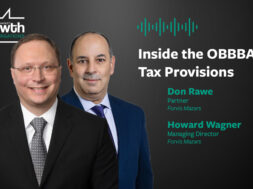Middle-Market Public Policy Roundup
Lawmakers consider a bill that would hike reporting requirements for PE firms with health care holdings, the Senate vets Trump's Fed picks, and an SEC commissioner steps down.

In this week’s roundup, we look at proposed legislation that would increase reporting requirements for private equity firms investing in health care providers. We also provide a summary of the Senate’s confirmation hearing of President Trump’s picks to the Federal Reserve Board, which included questioning of one nominee about her unconventional views on monetary policy. Finally, we examine the departure of an SEC commissioner whose term officially ended last week.
Bill Would Increase Reporting Requirements for PE Health Care Investors
Legislation currently being considered by the House Committee on Ways and Means would level steeper requirements for private equity firms investing in medical services.
The Transparency in Health Care Investments Act would require private equity firms that own and control medical care providers to report additional information to regulators in order to “shed sunlight” on the impact investment activity may have on patient costs, lawmakers said during a markup session on Feb 12.
“Increasingly, private equity firms are investing in areas such as emergency departments, ambulatory surgery centers, trauma units, nursing homes and hospitals, as well as health insurance companies,” said committee Chairman Rep. Richard Neal, D-Mass., in a statement. “This reporting will enable policy makers and regulators to better understand private equity’s effects on the health system.”
The bill, introduced on Feb. 10, has not yet been passed by the committee, which must occur before it can be voted on by the House.
Fed Nominee Who Advocated Returning to Gold Standard Pressed by Lawmakers
One of President Trump’s nominees for the Federal Reserve faced intense questioning from policymakers for unorthodox views on monetary policy.
Judy Shelton and Christopher Waller, Trump’s picks to fill two vacancies on the Federal Reserve Board of Governors, were examined by the Senate Committee on Banking, Housing and Urban Affairs on Feb. 13.
Shelton was an informal adviser to Trump’s 2016 presidential campaign and most recently served as the U.S. representative to the European Bank for Reconstruction and Development. Waller is a research director at the Federal Reserve Bank of St. Louis, where he has served since 2009.
Shelton is a divisive pick for the Federal Reserve because she has advocated for returning to the gold standard, which would hamper the Fed’s ability to respond to inflation and unemployment.
James Grant, a friend of Shelton, wrote in The Wall Street Journal that the nomination of Shelton would cause discussion at the Fed to be “tilted to gold.”
“[Shelton contends] the gold standard is a reputable, even superior, form of monetary organization,” Grant wrote in the article that was referenced during the hearing.
Lawmakers didn’t hesitate to seize on Shelton’s unconventional views to question her fitness for the Fed role.
“There are conservatives and liberals and most people fall somewhere in the middle of that continuum,” Sen. Sherrod Brown, D-Ohio, said. “But Miss Shelton is not a conservative, she is far outside the mainstream. She is off the ideological spectrum.”
When the committee Chairman Sen. Mike Crapo, R-Idaho, asked Shelton to clarify her positions, she said she would not “advocate going back to a prior historical monetary arrangement.”
However, senators then mentioned reports that Shelton had allegedly told Vice President Mike Pence to hasten a return to the gold standard. The conversation included a proposal for a “new Bretton,” a reference to the Bretton Woods Conference held during World War II where allied nations agreed to tie their currencies to the value of gold, a system that ended when the U.S. abandoned the gold standard in 1971.
“What I was suggesting there is that having a stable international level monetary playing field is very supportive of free trade, consistent with the principles of comparative advantage and mutual benefit,” Shelton explained.
Skepticism went beyond party lines. Richard Shelby, a Republican from Alabama, said he was “concerned” over Shelton’s writings.
Crapo described the hearing as “very aggressive,” and her candidacy faces a slim chance of success. A single Republican vote in the committee against her could end her nomination, which would be Trump’s fifth failed attempt to fill the Fed’s ranks.
If approved by the Senate, Shelton will serve the remainder of a 14-year term that expires in 2024. Waller would serve a term that ends in 2030. But first they must pass through the Senate Banking Committee, which has not yet brought the nominations to vote.
Briefs
National Science Foundation Purchasing Data to Study Private Capital
The federal agency that supports research and education across multiple fields of science and engineering is intending to acquire data for research into private capital.
The National Science Foundation and National Center for Science and Engineering Statistics released a notice of intent on Feb. 11 to purchase access to venture capital and private equity data from PitchBook for the next year.
The NSF and NCSES conducts research and publishes reports on the U.S. and international science and engineering enterprise.
“One area of importance is venture capital and private equity investment that is critical for commercializing nascent and emerging technologies,” the agencies said in the notice.
The organizations did not disclose what projects the information would be used for but said they require “comprehensive and accurate data and information on global venture capital and private equity financing, including by country, financing stage, and technology area.”
Trump Budget Would Cut Post-Enron Watchdog
The nation’s main accounting watchdog and a key part of Washington’s response to the Enron fraud would be eliminated in President Trump’s budget proposal.
The White House would consolidate the responsibilities of the Public Company Accounting Oversight Board into the Securities and Exchange Commission starting in 2022, according to a report from Bloomberg Government.
Shutting down the board would save $580 million through 2030, the White House said, despite the organization being funded by companies, not taxpayers.
Commissioner Formally Steps Down from SEC
Securities and Exchange Commissioner Robert Jackson officially stepped down from his post at the SEC late last week.
“Serving on the Commission has been the privilege of my lifetime,” Jackson said in a statement released on his last day. “As I return to teaching, I will always carry with me the lessons I have learned from the exceptional people of this great agency—and the knowledge that men and women of tremendous intellect and integrity go to work each day across the Nation to keep our markets, and the American dream, safe.”
Jackson’s term expired in June 2019, but commissioners can remain at their posts for up to 18 months after their term has ended if a replacement has not been found. President Trump appointed Jackson, who took office in January 2018.
Jackson was one of two commissioners to vote against a proposed rule that would expand the definition of accredited investor. The proposal was approved by the SEC in December and is expected to be voted on later this year.
Jackson’s exit leaves Allison Lee as the lone Democrat on the commission. Lee, who was appointed last June, filled a vacancy left by Commissioner Kara Stein’s departure in early 2019.
Trump has not yet named Jackson’s replacement, but SEC attorney Caroline Crenshaw is reportedly under consideration. Crenshaw, who worked with Jackson, has served at the SEC since 2013 and previously worked under Stein.
Jackson leaves the SEC with an open seat among its five-member leadership and a temporary political imbalance at the agency. Typically, no more than three commissioners may be from the same political party. Jackson was a political independent but frequently voted with the commission’s Democrats. SEC Chairman Jay Clayton, also an Independent, similarly voted with the agency’s Republican appointees, Hester Peirce and Elad Roisman.
Peirce, whose term expires June 5, will be the next commissioner to step down.
Are you an ACG member who enjoys reading the public policy roundup? Join our Public Policy Interest Group to receive even more in-depth coverage of federal policy activity impacting the middle market, as well as opportunities to help shape ACG’s advocacy efforts.

Benjamin Glick is ACG Global’s marketing and communications associate.


